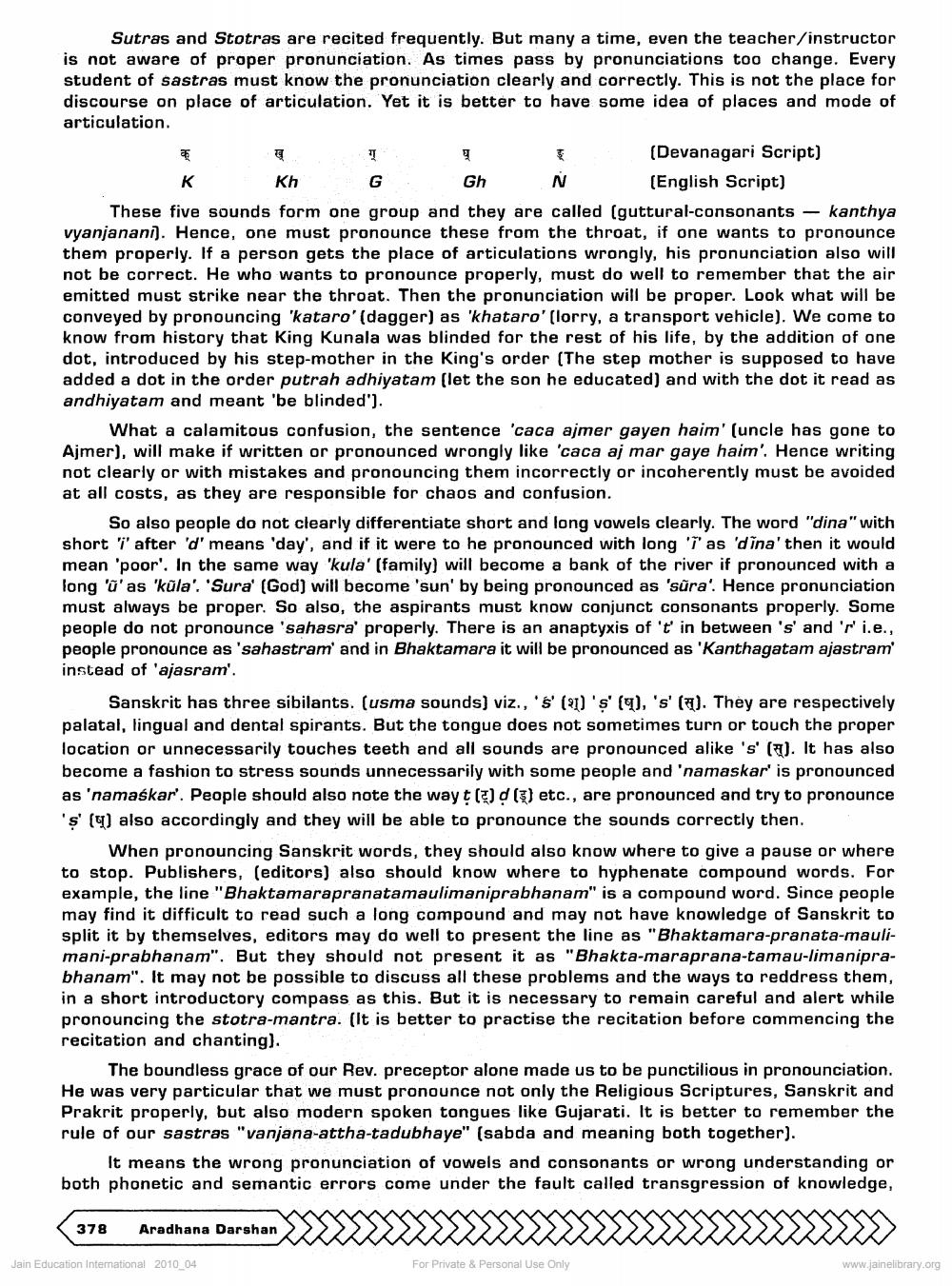________________
Sutras and Stotras are recited frequently. But many a time, even the teacher/instructor is not aware of proper pronunciation. As times pass by pronunciations too change. Every student of sastras must know the pronunciation clearly and correctly. This is not the place for discourse on place of articulation. Yet it is better to have some idea of places and mode of articulation.
(Devanagari Script) (English Script]
N
These five sounds form one group and they are called (guttural-consonants — kanthya vyanjanani). Hence, one must pronounce these from the throat, if one wants to pronounce them properly. If a person gets the place of articulations wrongly, his pronunciation also will not be correct. He who wants to pronounce properly, must do well to remember that the air emitted must strike near the throat. Then the pronunciation will be proper. Look what will be conveyed by pronouncing 'kataro' (dagger) as 'khataro' (lorry, a transport vehicle). We come to know from history that King Kunala was blinded for the rest of his life, by the addition of one dot, introduced by his step-mother in the King's order (The step mother is supposed to have added a dot in the order putrah adhiyatam (let the son he educated) and with the dot it read as andhiyatam and meant 'be blinded').
क्
K
ख्
Kh
What a calamitous confusion, the sentence 'caca ajmer gayen haim' (uncle has gone to Ajmer), will make if written or pronounced wrongly like 'caca aj mar gaye haim'. Hence writing not clearly or with mistakes and pronouncing them incorrectly or incoherently must be avoided at all costs, as they are responsible for chaos and confusion.
ཀྭ
G
So also people do not clearly differentiate short and long vowels clearly. The word "dina" with short 'i' after 'd' means 'day', and if it were to he pronounced with long 'I' as 'dina' then it would mean 'poor'. In the same way 'kula' (family) will become a bank of the river if pronounced with a long 'u' as 'kula'. 'Sura' (God) will become 'sun' by being pronounced as 'sura'. Hence pronunciation must always be proper. So also, the aspirants must know conjunct consonants properly. Some people do not pronounce 'sahasra' properly. There is an anaptyxis of 't' in between 's' and 'r' i.e., people pronounce as 'sahastram' and in Bhaktamara it will be pronounced as 'Kanthagatam ajastram' instead of 'ajasram'.
378
घ्
Gh
Sanskrit has three sibilants. (usma sounds) viz., 's' (1) 's' (q), 's' (). They are respectively palatal, lingual and dental spirants. But the tongue does not sometimes turn or touch the proper location or unnecessarily touches teeth and all sounds are pronounced alike 's' (). It has also become a fashion to stress sounds unnecessarily with some people and 'namaskar' is pronounced as 'namaskar'. People should also note the way t(?) d (3) etc., are pronounced and try to pronounce 's' (4) also accordingly and they will be able to pronounce the sounds correctly then.
When pronouncing Sanskrit words, they should also know where to give a pause or where to stop. Publishers, (editors) also should know where to hyphenate compound words. For example, the line "Bhaktamarapranatamaulimaniprabhanam" is a compound word. Since people may find it difficult to read such a long compound and may not have knowledge of Sanskrit to split it by themselves, editors may do well to present the line as "Bhaktamara-pranata-maulimani-prabhanam". But they should not present it as "Bhakta-maraprana-tamau-limaniprabhanam". It may not be possible to discuss all these problems and the ways to reddress them, in a short introductory compass as this. But it is necessary to remain careful and alert while pronouncing the stotra-mantra. (It is better to practise the recitation before commencing the recitation and chanting).
The boundless grace of our Rev. preceptor alone made us to be punctilious in pronounciation. He was very particular that we must pronounce not only the Religious Scriptures, Sanskrit and Prakrit properly, but also modern spoken tongues like Gujarati. It is better to remember the rule of our sastras "vanjana-attha-tadubhaye" (sabda and meaning both together).
It means the wrong pronunciation of vowels and consonants or wrong understanding or both phonetic and semantic errors come under the fault called transgression of knowledge,
Aradhana Darshan
Jain Education International 2010_04
For Private & Personal Use Only
www.jainelibrary.org




